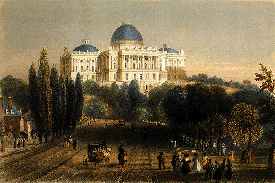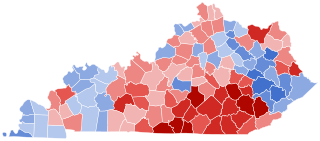
The 18th United States Congress was a meeting of the legislative branch of the United States federal government, consisting of the United States Senate and the United States House of Representatives. It met in Washington, D.C., from March 4, 1823, to March 4, 1825, during the seventh and eighth years of James Monroe's presidency. The apportionment of seats in the House of Representatives was based on the 1820 United States census. Both chambers had a Democratic-Republican majority.

The Mississippi State Senate is the upper house of the Mississippi Legislature, the state legislature of the U.S. state of Mississippi. The Senate, along with the lower Mississippi House of Representatives, convenes at the Mississippi State Capitol in Jackson.

The Mississippi Legislature is the state legislature of the U.S. state of Mississippi. The bicameral Legislature is composed of the lower Mississippi House of Representatives, with 122 members, and the upper Mississippi State Senate, with 52 members. Both representatives and senators serve four-year terms without term limits. The Legislature convenes at the Mississippi State Capitol in Jackson.
The 6th Texas Legislature met from November 5, 1855 to September 1, 1856 in its regular session and one adjourned session. All 80 members of the Texas House of Representatives and about half of the members of the Texas Senate were elected in 1855.
The 12th Texas Legislature met from February 8, 1870, to December 2, 1871, in four sessions — provisional, called, regular, and adjourned. It took up a martial law bill. Republicans were in the majority or the Reconstruction era body including some African Americans.

The Legislature of the State of Oklahoma is the state legislative branch of the U.S. state of Oklahoma. The Oklahoma House of Representatives and Oklahoma Senate are the two houses that make up the bicameral state legislature. There are 101 state representatives, each serving a two-year term, and 48 state senators, who serve four-year terms that are staggered so only half of the Oklahoma Senate districts are eligible in each election cycle. Legislators are elected directly by the people from single member districts of equal population. The Oklahoma Legislature meets annually in the Oklahoma State Capitol in Oklahoma City.
David C. Dickson Jr. was a state legislator, Mississippi Secretary of State, Lieutenant Governor of Mississippi and a U.S. Representative from Mississippi.

The following table indicates the party of elected officials in the U.S. state of Kentucky:

Michelle Louise Helene Fischbach is an American attorney and politician who is the U.S. representative from Minnesota's 7th congressional district. The district, which is very rural, is Minnesota's largest by area and includes most of the western part of the state. A Republican, Fischbach served as the 49th lieutenant governor of Minnesota from 2018 until 2019. As of 2024, she is the last Republican to have held statewide office in Minnesota.

The 1850–51 United States Senate elections were held on various dates in various states. As these U.S. Senate elections were prior to the ratification of the Seventeenth Amendment in 1913, senators were chosen by state legislatures. Senators were elected over a wide range of time throughout 1850 and 1851, and a seat may have been filled months late or remained vacant due to legislative deadlock. In these elections, terms were up for the senators in Class 1.

The 1822–23 United States Senate elections were held on various dates in various states. As these U.S. Senate elections were before the ratification of the Seventeenth Amendment in 1913, senators were chosen by state legislatures. Senators were elected over a wide range of time throughout 1822 and 1823, and a seat may have been filled months late or remained vacant due to legislative deadlock. In these elections, terms were up for the senators in Class 2.

The 2022 Georgia lieutenant gubernatorial election was held on November 8, 2022, to elect the lieutenant governor of the U.S. state of Georgia. It coincided with various other statewide elections, including for U.S. Senate, U.S. House, and Governor of Georgia. Georgia is one of 21 states that elects its lieutenant governor separately from its governor.
The 1892–1896 Mississippi Legislature was a legislative term in the United States composed of the Mississippi State Senate and the Mississippi House of Representatives that met in two sessions in 1892 and 1894.
The 1900–1904 Mississippi Legislature was convened in two sessions: a regular session that lasted from January 2, 1900 to March 12, 1900, and a special session that lasted from January 7, 1902, to March 5, 1902.
The 1st Mississippi Legislature met between October 6 and February 6, 1818, first in Washington and then in Natchez, Mississippi.
The 4th Mississippi Legislature met from January 1, 1821, to February 12, 1821, in Natchez, Mississippi.
The 5th Mississippi Legislature met in Columbia, Mississippi in two sessions: first from November 5, 1821, to November 24, 1821, and then a special session from June 3, 1822, to June 30, 1822.
The 6th Mississippi Legislature met in Jackson, Mississippi, between December 23, 1822, and January 21, 1823.
The 8th Mississippi Legislature met from January 3, 1825 to February 4, 1825 in Jackson, Mississippi.
The 11th Mississippi Legislature met in Jackson, Mississippi, from January 7, 1828, to February 16, 1828.








